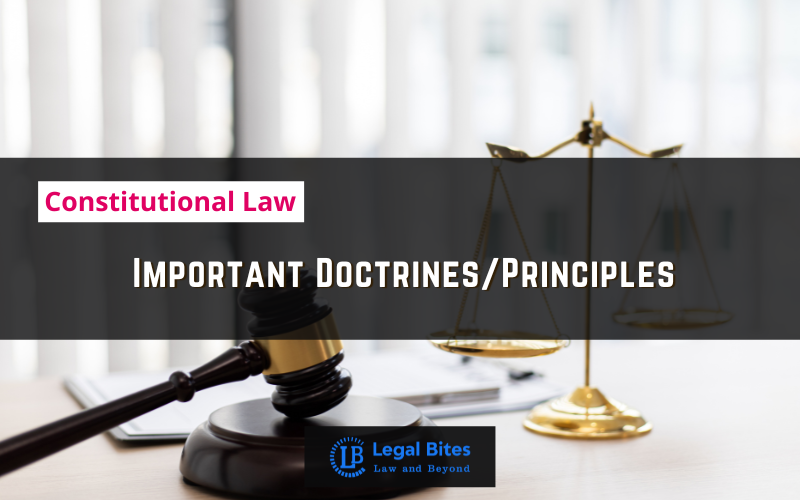What are the Principles of Natural Justice? Is there any exception to this rule of Natural Justice? Discuss.
Question: What are the Principles of Natural Justice? Is there any exception to this rule of Natural Justice? Discuss. [BJS 2018] Find the answer to the mains question only on Legal Bites. [What are the Principles of Natural Justice? Is there any exception to this rule of Natural Justice? Discuss. [BJS 2018] Answer: ‘Natural Justice’ is an expression… Read More »
;
Question: What are the Principles of Natural Justice? Is there any exception to this rule of Natural Justice? Discuss. [BJS 2018] Find the answer to the mains question only on Legal Bites. [What are the Principles of Natural Justice? Is there any exception to this rule of Natural Justice? Discuss. [BJS 2018] Answer: ‘Natural Justice’ is an expression of English Common Law having its origin in Jus natural (law of Nature.) Principles of natural justice are those rules which have been...
Question: What are the Principles of Natural Justice? Is there any exception to this rule of Natural Justice? Discuss. [BJS 2018]
Find the answer to the mains question only on Legal Bites. [What are the Principles of Natural Justice? Is there any exception to this rule of Natural Justice? Discuss. [BJS 2018]
Answer:
‘Natural Justice’ is an expression of English Common Law having its origin in Jus natural (law of Nature.) Principles of natural justice are those rules which have been laid down by the Courts as being the minimum protection of the rights of the individual against the arbitrary procedure that may be adopted by a judicial, quasi-judicial and administrative authority while making an order affecting those rights. These rules are intended to prevent such authority from doing injustice.
Natural Justice recognizes three principles:
- Nemo debet essc judex in propria causa. – This means that no one should be a judge in his own cause i.e., there should be no bias
- Audi altered partem – This means ‘hear alternate party i.e., ‘no one should be condemned unheard.
- Ratio decidendi – Speaking orders or reasoned decisions
Therefore, the requirements of procedural fairness are on first appearance applicable to Judicial, Quasi-Judicial, and Administrative Proceedings, however, the decision-maker may be exempt from all or some of the procedural safeguards that would otherwise be required. So, we say that there are certain Common Law Exceptions to the Principles of Natural Justice which are:
a. During the Emergency period
During a situation of emergency, where the right to be heard will affect the government process, it will be excluded by the law for the time being. This means that any hearing or any process which may jeopardize the interest of the public at large would not be needed under the principle of natural justice and any such right would be obviated for the time being.
b. Public interest
In Balco Employees Union vs. UOI (2001), the SC established that the principles of natural justice had no role to play in those situations where policies considering the public at large were to be undertaken. It was that unless any action of the government is arbitrary, illegal or unenforceable due to any valid reason, the decision of the government cannot be challenged as a violation of the principles of natural justice.
c. Express statutory provision
The principle of natural justice can be excused by certain acts of the parliament who may through its powers get rid of the procedures that are otherwise necessary for any administrative action. A statute may exclude natural justice either expressly or by necessary implication
However, the act of parliament which doesn’t permit the citizens with certain fundamental rights during the time period of the enactment will come under the scrutiny of the court and may be challenged under Article 14 of the Constitution.
d. Exception where no right of an individual has been infringed
The Latin principle Ubi jus, ibi remedium stands for where there is a right, there is a remedy. So naturally, in cases where there arises no right, no remedy can be granted. Thus, where a person does not have any right, and neither can he derive any right from any statute or any common law provision, he cannot ask for a remedy in that case under the principles of natural justice, and he may in such case forfeit procedural fairness.
Important Mains Questions Series for Judiciary, APO & University Exams
- Constitutional Law Mains Questions Series Part-I
- Constitutional Law Mains Questions Series Part-I
- Constitutional Law Mains Questions Series Part-II
- Constitutional Law Mains Questions Series Part-IV
- Constitutional Law Mains Questions Series Part-V
- Constitutional Law Mains Questions Series Part-VI
- Constitutional Law Mains Questions Series Part-VII
- Constitutional Law Mains Questions Series Part-VIII
- Constitutional Law Mains Questions Series Part-IX
- Constitutional Law Mains Questions Series Part-X



